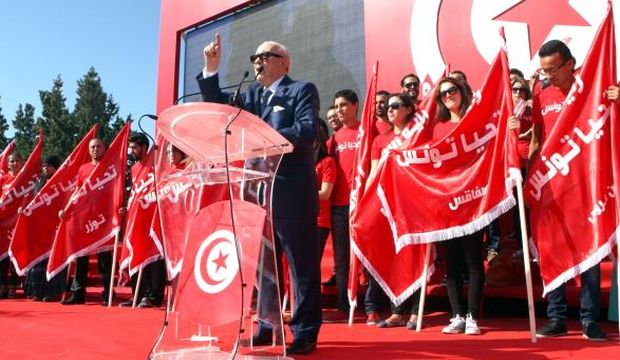
Beji Caid El-Sebsi (C), Tunisian leader of the secularist party Nidaa Tounes (Tunisian Call) and presidential candidate, gives a speech during his first campaign meeting on November 2, 2014 in the central coastal city of Monastir, Tunisia. (AFP Photo/Bechir Bettaib)
Tunis, Asharq Al-Awsat—Following the Nidaa Tounes party’s victory in last week’s parliamentary elections, party leader Beji Caid El-Sebsi launched his presidential campaign on Sunday in the coastal city of Monastir, birthplace of the first president of the modern Tunisian republic, Habib Bourguiba.
Bourguiba is regarded in Tunisia not only as the country’s “father of independence,” but also as a secularist icon. Sebsi’s decision to launch his campaign from Bourguiba’s birthplace is therefore symbolic in a number of ways, with Sebsi’s secularist party running in last week’s parliamentary elections on a largely anti-Islamist stance and with Sebsi previously holding the posts of minister of defense, interior, and foreign affairs in successive Bourguiba cabinets.
Addressing his supporters on Sunday at a rally in the coastal city, 87-year-old Sebsi said—in a reference to the instability the country has suffered since it kick-started the “Arab Spring” in January 2011—that he was running for the presidency to return “the prestige of the state,” and to help form “a new generation capable carrying the flame [from the older generation] in order to lead Tunisia to safety.”
During the almost-four years since the start of the revolution which toppled ex-president Zine El-Abidine Ben Ali, Tunisia has experienced a host of political, economic and security troubles.
The Islamist Ennahda swept to power in a resounding victory in parliamentary elections in 2011—the first in Tunisia’s history—echoing other post-Arab Spring gains for Islamist groups, most notably the Egyptian wing of Ennahda’s parent organization, the Muslim Brotherhood, in Egypt’s 2011 parliamentary and 2012 presidential elections.
But like the Brotherhood in Egypt, Ennahda’s time in office was brief, agreeing—unlike the Brotherhood in Egypt, which was forcibly removed from power in 2013—to voluntarily step aside in January 2014 to make way for an interim national unity government until a new constitution was adopted and fresh parliamentary elections were held later that year.
In last week’s elections, Ennahda came second with 69 of 217 seats in Tunisia’s parliament, compared to Nidaa Tounes’s 85.
But some have expressed concern with Sebsi’s campaign. Nidaa Tounes’s win in the elections last week, which gives it a right to name a prime minister and form a coalition government, if followed by a win for the party’s leader in the presidential elections, will give it control of the presidency, parliament, and the premiership—an uncomfortable reminder of the decades of one-party rule under Ben Ali.
Others have expressed concerns about Sebsi’s past, with the veteran politician having served as head of parliament under Ben Ali.
Sebsi is likely to face stiff competition for the presidency from other secularists. A meeting was held between several candidates at the end of last week, including former head of parliament and the current secretary-general of social–democratic party Ettakatol, Mustapha Ben Jafar. Many observers saw the meeting as an attempt to decide on an alternative secular presidential candidate to face off against Sebsi, now considered the frontrunner in the race.
However, the move now seems unlikely, observers say, paving the way for a splitting of the secularist vote and a Sebsi victory at the polls on November 23.
Also running for the presidency is Tunisia’s first post-Arab Spring president Moncef Marzouki, former governor of the Tunisian central bank Mustapha Kamel Nabli, former Ben Ali-era figure Kamel Morjane, and former magistrate and head of the Association of Tunisian Judges, Kalthoum Kannou, previously a vocal opposition figure during the Ben Ali regime and the sole female candidate in the race.
